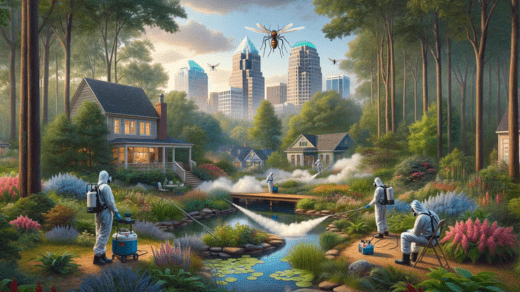Mosquitoes are more than just annoying pests; they pose significant health risks to residents of Raleigh, North Carolina. As the temperatures rise and the humidity increases, mosquito populations thrive, leading to increased concerns about mosquito-borne diseases. In this article, we’ll delve into the various aspects of mosquito control in Raleigh, from understanding the problem to implementing effective solutions.
Introduction to Mosquito Infestation in Raleigh
Mosquitoes are a common nuisance in Raleigh, especially during the warmer months. With the city’s humid subtropical climate providing ideal breeding conditions, mosquitoes find ample opportunities to proliferate. Beyond their irritating bites, mosquitoes are vectors for diseases such as West Nile virus, Zika virus, and Eastern equine encephalitis, making effective control measures imperative.
Understanding Mosquito Abatement
Mosquito Abatement Raleigh refers to the systematic approach of reducing mosquito populations to manageable levels. This involves various techniques, including larviciding, adulticiding, source reduction, and habitat modification. By targeting mosquitoes at different stages of their life cycle and their breeding grounds, abatement efforts aim to interrupt their reproductive cycle and reduce their numbers.
Preventive Measures for Mosquito Control in Raleigh
Prevention is key to effective mosquito control. Residents can take simple yet impactful measures to eliminate mosquito breeding grounds around their homes, such as removing stagnant water, maintaining gutters, and trimming vegetation. Additionally, installing screens on doors and windows and using mosquito repellents can help reduce exposure to mosquitoes.
Hiring a Professional Mosquito Exterminator
While DIY methods can be effective to some extent, hiring a professional mosquito exterminator offers several advantages. Experienced exterminators have the knowledge, expertise, and equipment to identify mosquito breeding sites, assess the severity of infestation, and implement targeted control measures. When selecting an exterminator in Raleigh, it’s essential to choose a licensed and reputable professional with a track record of success.
Raleigh Mosquito Treatment Options
Various treatment options are available for controlling mosquito populations in Raleigh. These include larvicides, which target mosquito larvae in standing water, and adulticides, which are used to kill adult mosquitoes. Additionally, biological control methods, such as introducing mosquito-eating fish and bacteria, can help reduce mosquito populations without harming the environment.
Choosing the Right Mosquito Control Service
When choosing a mosquito control service, it’s crucial to consider factors such as experience, reputation, and effectiveness. Reputable companies will conduct thorough inspections, develop customized treatment plans, and provide ongoing monitoring to ensure the success of their services. Additionally, environmentally conscious consumers may prefer companies that offer eco-friendly treatment options.
The Impact of Mosquito Infestation on Health
Mosquito bites not only cause discomfort but also pose significant health risks. In Raleigh, mosquitoes can transmit diseases such as West Nile virus, Eastern equine encephalitis, and Zika virus, among others. These diseases can have serious consequences, ranging from mild symptoms to severe neurological complications, highlighting the importance of effective mosquito control measures.
Environmental Impact of Mosquito Control Methods
While controlling mosquito populations is essential for public health, it’s also important to consider the environmental impact of control methods. Some chemical insecticides used in mosquito control can have adverse effects on non-target organisms and ecosystems. Therefore, there is a growing emphasis on developing and implementing eco-friendly mosquito control strategies that minimize harm to the environment.
Community Efforts for Mosquito Control
Mosquito control is not solely the responsibility of individuals or professional services; it requires a collective effort from the community. Community engagement and participation in mosquito control programs, such as neighborhood clean-up campaigns and source reduction initiatives, can significantly contribute to reducing mosquito populations and mitigating the risk of mosquito-borne diseases.
Educational Programs for Mosquito Awareness
Educating the public about mosquitoes and the importance of mosquito control is essential for fostering a culture of proactive prevention. In Raleigh, various educational programs and initiatives aim to raise awareness about mosquito biology, breeding habits, and disease transmission. By empowering residents with knowledge, these programs enable them to take informed actions to protect themselves and their communities.
Current Initiatives in Raleigh for Mosquito Control
Raleigh’s local government, in collaboration with public health agencies and community organizations, is actively involved in mosquito control efforts. Ongoing initiatives include surveillance programs to monitor mosquito populations, targeted spraying in areas with high mosquito activity, and public outreach campaigns to educate residents about Mosquito Prevention Raleigh NC strategies.
The Future of Mosquito Control in Raleigh
Looking ahead, advancements in technology and scientific research offer promising prospects for more effective mosquito control in Raleigh. From the development of novel mosquito control methods to the use of predictive modeling to anticipate outbreaks, ongoing innovations aim to enhance the efficiency and sustainability of mosquito control efforts in the city.
Mosquito control is a pressing concern in Raleigh, given the city’s conducive climate for mosquito breeding and the associated health risks. By adopting a multi-faceted approach that combines preventive measures, professional services, community engagement, and technological innovations, residents can take proactive steps to mitigate the threat posed by mosquitoes and safeguard public health.



